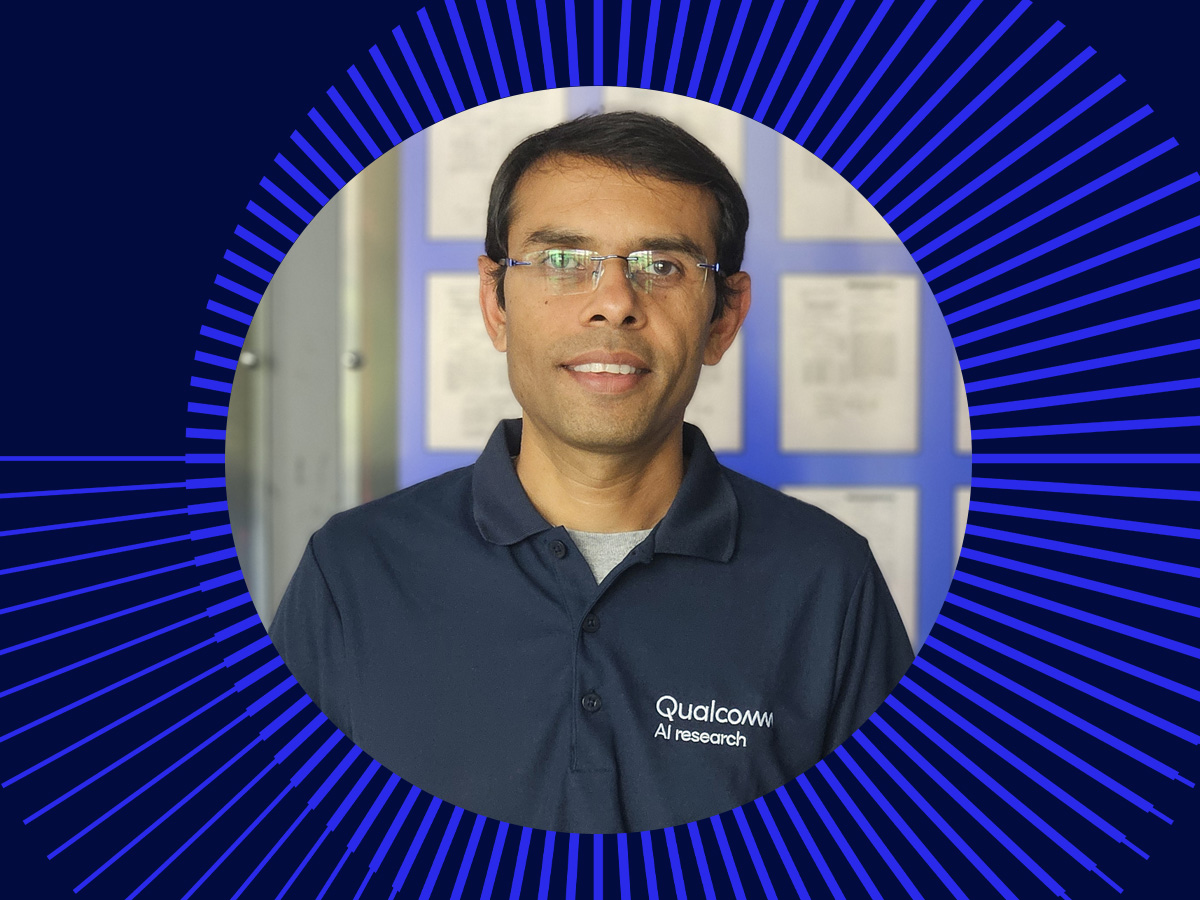From Disassembling Car Windows to Decoding the Future of AI: Meet Chirag Patel
Rhea-AI Summary
Qualcomm Technologies' senior director of AI product management, Dr. Chirag Patel, shares insights into his 18-year journey at the company and his transition from wireless to AI technology. With over 750 patents granted globally, Patel leads the generative AI technology portfolio, focusing on bringing AI concepts to market. His work includes developing the AI Model Efficiency Toolkit (AIMET) and launching several world-first edge, on-device generative AI demonstrations. Patel emphasizes the growing impact of AI across smartphones, automotive, IoT, and various industries, highlighting Qualcomm's role in advancing edge AI technology.
Positive
- Portfolio of over 750 patents granted globally
- Successfully developed AI Model Efficiency Toolkit (AIMET)
- Leading position in edge AI and generative AI technology
Negative
- None.
News Market Reaction
On the day this news was published, QCOM declined 0.34%, reflecting a mild negative market reaction.
Data tracked by StockTitan Argus on the day of publication.
NORTHAMPTON, MA / ACCESSWIRE / November 27, 2024 / Qualcomm

Qualcomm Technologies' senior director of AI product management Chirag Patel is working to bring AI concepts to market
5 Facts About Dr. Chirag Patel
Title: Senior Director, AI Product Management at Qualcomm Technologies, Inc.
Alma Mater: Ph.D., Electrical Engineering with a focus on wireless, Georgia Tech
Years at Qualcomm: 18
Role: Lead product management for generative AI.
Impact: With more than 750 patents granted globally, their contributions have helped position Qualcomm as a leader in generative AI and wireless technology, in turn influencing global technology trends.
Speed Round
Texting or calling? Texting
Star Trek or Star Wars? Star Trek
Early Bird or night owl? Early bird
Mountain climbing or skydiving? Skydiving
Favorite work snack? Almonds
The key to successful engineering is to find the simplicity in complexity: the one easy thing that unlocks the solution to a thorny challenge. This applies to careers as well, and if you look at the work of Qualcomm Technologies' Dr. Chirag Patel, who holds a Ph.D. in electrical engineering, you see someone who understands not just technology, but the inflection points in it - where technology is going.
Like many engineers, Patel was introduced to the field by his parents. Patel's father was an electrical engineer in India, and he inspired Patel to take apart broken appliances and gadgets to see how they worked… or didn't work.
He discovered that, to him at least, the world of machines was simpler than he thought. More recently, when his 15-year-old car's window stopped going up and down, Patel took the door apart to see if he could decode its inner workings. To his relief, he found a relatively simple mechanism (still, he has learned over the years to write down and photograph the steps to disassemble machines that he eventually wants to put back together). With memories of explorations from his childhood, he knows that many things require only persistence to repair, not professional help.
Inventing new technology, though, does require a deep dive. For example, as a student, Patel was drawn to the challenge of advancing the leading edge of wireless communication. In college, he learned about and worked on code-division multiple access (CDMA) technologies, which led to his first major career choice. Eventually, artificial intelligence (AI) proved to be an irresistible draw. And the connection from wireless to AI is more direct than you might think…
The OnQ Team (OnQ): Why did you join Qualcomm?
Chirag Patel (CP): My college project was on CDMA technology, where I wrote a very basic software simulator for CDMA transceiver system. Of course, Qualcomm was a leader in CDMA. I was an IEEE member and would read articles about Qualcomm's innovations, which fascinated me. I wanted to be part of, and contribute to, the emerging mobile wireless revolution.
Qualcomm was obviously the best place to be for someone interested in wireless R&D. There was no other choice. So I started as an intern in 2005 and then transitioned to a full-time role as a wireless R&D engineer in 2006.
OnQ: Before Qualcomm, what was your academic background?
CP: I have a PhD in Electrical Engineering from Georgia Tech, specializing in wireless communication. My time at Georgia Tech allowed me to explore the depths of wireless technology, including mobile-to-mobile wireless communication, and it set me up for my future career.
Before moving to the United States for my higher studies, my early education was in India.
OnQ: How and why did you make the move from wireless to AI?
CP: For 12 or 13 years, I was working on 3G/4G/5G - engineering, standards, licensing and customer engagements. I liked it, but the AI bug bit me as part of a project we were doing for a customer. I found it fascinating. Around 2019, I joined Qualcomm AI Research, where I decided to go back to hardcore engineering and understand the technology as much as I can.
It was a very dynamic period. It was hard for anyone to know everything about it. But starting in 2019 I was completely in it.
As a wireless systems engineer, I have a background in statistics, probability and communication theory. A lot of those underlying foundations apply to AI, especially to the work on quantization and compression which is at the heart of our edge AI platform.
It's very similar to what you do with signal processing in wireless. So that made the transition easier.
OnQ: What are you working on now?
CP: I am a Senior Director of AI Product Management. I lead the generative AI technology portfolio, which involves working with AI engineering teams for feature planning, with a focus on comprehensive system analysis and solutions, and translating these into AI products across different business units. Our mission is to make Qualcomm Technologies the leader in edge AI.
OnQ: Now that you've been in AI for a while, what is it about the field you find most interesting?
CP: The technology is mind boggling, right? You can see the impact everywhere. And it's spreading - we have AI smartphones, AI PCs and generative AI is moving into Auto, IoT, all sorts of products.
What will make an impact in your day to day? That's what we're working on.
OnQ: What is it like being an inventor and innovator at Qualcomm?
CP: It's working with the best people. When I started in wireless, it gave me the best exposure to the brightest minds in the field. The depth and caliber. I've been fortunate to work with all these great people.
At the same time, Qualcomm offers opportunities to jump around, try different things. Obviously, you have to have the caliber and smarts to actually make the transitions, but Qualcomm nurtures you and opens up doors.
OnQ: Where do you get your inspiration day to day?
CP: Qualcomm is in serious competition all the time. We're here as the company with best engineering ethos to innovate, out-execute and deliver ahead of the competition.
Pressure cooker situations motivate me further. I actually enjoy running high-stakes demos, like when we showed off small-cell technology for Mark Zuckerberg, when he came to campus with all his bodyguards and we had sections cordoned off. I always want to deliver as best as possible.
OnQ: What work has made you the most proud?
CP: Lately, the AI work has made me proud, especially the work on the AI Model Efficiency Toolkit (AIMET) and several of the world's first edge, on-device generative AI demos and generative AI commercial product launches.
It was a challenging transition, and I was able to understand, execute and deliver on new technology and make an impact for Qualcomm.
OnQ: Do you have any advice on how to be an effective collaborator at Qualcomm?
CP: Find someone you can talk to frankly - a good mentor. Maybe not an official mentor, but definitely someone who can give you a push if you're stuck.
Also, be that mentor for other people. I tell people that come to talk to me, if something is bothering you, do something about it, don't delay. Qualcomm values these interactions, and everyone tries to help each other. At the same time, don't get too comfortable. It's okay to jump projects or try new things every couple of years. That's another blessing we offer.
OnQ: What advice would you have on how to encourage innovation and the creation of new ideas, at the largest scale?
CP: A lot of innovation in the U.S. now, especially AI, is private money. Back when I was in college, I was grateful that the U.S. government was funding the grants for the research I was doing. It was incredibly valuable.
Watch a demo of the world's fastest Stable Diffusion running on a smartphone
To be competitive on a global scale, we need more government support and collaborations with the private sector. Things are heading in that direction, such as with the CHIPS Act, and I hope this continues with more investments in AI infrastructure.
At the same time, the private sector needs to focus on fundamental problems to maintain U.S. leadership. We need to get to that happy medium where both sectors drive the engines of innovation and growth.
OnQ: Finally, can you tell us where Generative AI is going next?
CP: The most immediate impact will be on smartphones and the compute side. And then, automotive, IoT, etc. For example, the in-car cockpit experience will be completely re-defined - natural, interactive and fun. You'll talk to your car; it will be your digital chauffeur.
Generative AI will also make its way into home devices; an AI-centered product could emerge to combine all your home devices to become a home assistant, life logger and so on. There are endless possibilities. It's going to be about personalized experiences with any and every device you have, secure and private. I think that's a good thing, and this is where Qualcomm plays.
Also, when you think about AI, think broader: while ChatGPT takes mindshare in headlines, AI will make a more long-lasting impact in areas like medicine and drug discovery, energy, manufacturing and so on.
There's lots more to come.
Editor's Note: The above interview was transcribed and consolidated by AI, then written and edited manually by our editors for editorial clarity.
Sign up for our What's Next in AI and Computing newsletter
Apply for an AI role at Qualcomm
Read about our next inventor: Diana Maamari
View additional multimedia and more ESG storytelling from Qualcomm on 3blmedia.com.
Contact Info:
Spokesperson: Qualcomm
Website: https://www.3blmedia.com/profiles/qualcomm
Email: info@3blmedia.com
SOURCE: Qualcomm
View the original press release on accesswire.com







